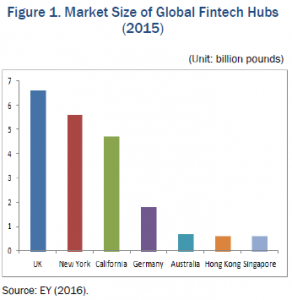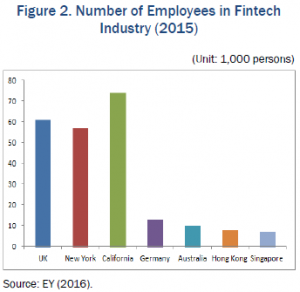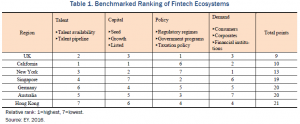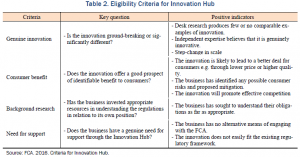Yang Hyoeun: The UK's Fintech Industry Support Policies and its Implications
2017-05-19 IMI
 Since the global financial crisis in 2008, the level of customers’ trust in traditional banks has sharply declined and the demand for conventional financial services has also decreased while the need for structural reform in the financial services sector has increased globally. This request for reform was very strong in the UK as the financial services industry has been one of the most important industries for the British economy. In this context, the UK government has emphasized the concept of innovation in its new economic policies as a means of recovering from the financial downturn and discovering new sources of growth. Following the call for improving customers’ benefits and competitiveness of the financial services market, the UK fintech industry has rapidly evolved by utilizing a competitive financial infrastructure and providing innovative ways of providing financial services.
From 2008 to 2013 the size of transactions related to the fintech industry has increased 74% each year and the amount of investment has increased by eight-fold. While the Brexit decision has significantly increased the level of uncertainty in the UK economy, it is interesting to note that London ranked as the top international financial center (IFC) in 2016 according to the Financial Times. While the future of financial markets in the UK is still uncertain due to the Brexit decision, its negative impact on the fintech industry has not been visible so far. According to a survey of 1,200 CEOs and executive officers in major UK fintech companies following the Brexit referendum, most of the respondents expected that the negative impact of Brexit on the fintech industry would not be serious, when considering the rapid growth of the UK digital economy and that more than 40% of new fintech companies in Europe valued at a billion dollars or more are located in the UK. The confidence indicates that the growth of the UK fintech industry is not based on short- term foreign investments or certain fintech companies or products. Instead, the innovative and business-friendly regulatory policy of the government has led the UK fintech ecosystem.
UK’s Fintech Ecosystem
The rapid growth of the UK fintech industry is closely linked to the high quality of its fintech ecosystem. The global consulting agency Ernst & Young analyzed the quality of fintech ecosystems based on four categories: talent, capital, policy, and demand (Ernst & Young 2016). According to this analysis of the quality of fintech ecosystems, the UK has the best ecosystem among global fintech hubs. While California is ranked at the top in the level of capital due to the abundant venture capital markets located in Silicon Valley and the UK was ranked as third, the UK greatly outweighed other fintech hubs in terms of its quality of government policy, including regulatory regimes, government programs, and taxation policy.
Since the global financial crisis in 2008, the level of customers’ trust in traditional banks has sharply declined and the demand for conventional financial services has also decreased while the need for structural reform in the financial services sector has increased globally. This request for reform was very strong in the UK as the financial services industry has been one of the most important industries for the British economy. In this context, the UK government has emphasized the concept of innovation in its new economic policies as a means of recovering from the financial downturn and discovering new sources of growth. Following the call for improving customers’ benefits and competitiveness of the financial services market, the UK fintech industry has rapidly evolved by utilizing a competitive financial infrastructure and providing innovative ways of providing financial services.
From 2008 to 2013 the size of transactions related to the fintech industry has increased 74% each year and the amount of investment has increased by eight-fold. While the Brexit decision has significantly increased the level of uncertainty in the UK economy, it is interesting to note that London ranked as the top international financial center (IFC) in 2016 according to the Financial Times. While the future of financial markets in the UK is still uncertain due to the Brexit decision, its negative impact on the fintech industry has not been visible so far. According to a survey of 1,200 CEOs and executive officers in major UK fintech companies following the Brexit referendum, most of the respondents expected that the negative impact of Brexit on the fintech industry would not be serious, when considering the rapid growth of the UK digital economy and that more than 40% of new fintech companies in Europe valued at a billion dollars or more are located in the UK. The confidence indicates that the growth of the UK fintech industry is not based on short- term foreign investments or certain fintech companies or products. Instead, the innovative and business-friendly regulatory policy of the government has led the UK fintech ecosystem.
UK’s Fintech Ecosystem
The rapid growth of the UK fintech industry is closely linked to the high quality of its fintech ecosystem. The global consulting agency Ernst & Young analyzed the quality of fintech ecosystems based on four categories: talent, capital, policy, and demand (Ernst & Young 2016). According to this analysis of the quality of fintech ecosystems, the UK has the best ecosystem among global fintech hubs. While California is ranked at the top in the level of capital due to the abundant venture capital markets located in Silicon Valley and the UK was ranked as third, the UK greatly outweighed other fintech hubs in terms of its quality of government policy, including regulatory regimes, government programs, and taxation policy.
 Innovative Regulatory Environment
While in the past the rigid regulatory system of the UK had been blamed for disrupting the development of the UK fintech industry, the
effective regulatory reform and facilitation of public-private partnership driven by the gov- ernment in recent years have succeeded in promoting the fintech industry as a new engine for growth in the UK. Most of all, in April 2013 the UK government divided the financial regulatory system into two parts: the Pruden- tial Regulation Authority (PRA) for the pur- pose of supervising systemically important financial institutions, and the Financial Con- duct Authority (FCA) for supervising the con- duct of other financial institutions.
The core objectives of the FCA included improving consumer protection, the prudentiality of the financial system, and the competitiveness of financial services. During the process of restructuring the global financial markets after the global financial crisis, the FCA focused on the potential of the innovative fintech industry as a remarkable way of improving the benefits of consumers in the financial market and has actively supported fintech startups and introduced creative ways of regulating new
and innovative products. While the traditional role of financial supervisory institutions had been limited to overseeing any illegal conduct by businesses in the market, the interactive approach of the FCA to regulation has provided the best soil for the remarkable growth of the fintech industry with innovative ideas and services. The Project Innovate Initiative of the FCA has been considered one of the most successful policies in support of innovative fintech businesses. With the purpose of providing direct support to innovative businesses and improving related administrative procedures, the Initiative has changed the role of financial supervisory institutions from rigid supervisors to creative supporters of innovative businesses. Under the initiative, the Innovation Hub was introduced as a team dedicated to supporting new and established fintech businesses for authorization so that innovative fintech startups or existing businesses with innovative ideas could have easier access to the market by mitigating regulatory risks while maintaining the adequate level of stability in the financial market.
Innovation Hub
In October 2014, the FCA launched a new program called Innovation Hub which provides dedicated support for innovator businesses to be able to introduce innovative financial products and services with less regulatory costs and burden.
In order for a business to be eligible for the support of this innovation hub, it must prove that the specific product or service includes innovative factors significantly different from existing ones and that the innovation offers considerable benefit to consumers (see Table 2).
Innovative Regulatory Environment
While in the past the rigid regulatory system of the UK had been blamed for disrupting the development of the UK fintech industry, the
effective regulatory reform and facilitation of public-private partnership driven by the gov- ernment in recent years have succeeded in promoting the fintech industry as a new engine for growth in the UK. Most of all, in April 2013 the UK government divided the financial regulatory system into two parts: the Pruden- tial Regulation Authority (PRA) for the pur- pose of supervising systemically important financial institutions, and the Financial Con- duct Authority (FCA) for supervising the con- duct of other financial institutions.
The core objectives of the FCA included improving consumer protection, the prudentiality of the financial system, and the competitiveness of financial services. During the process of restructuring the global financial markets after the global financial crisis, the FCA focused on the potential of the innovative fintech industry as a remarkable way of improving the benefits of consumers in the financial market and has actively supported fintech startups and introduced creative ways of regulating new
and innovative products. While the traditional role of financial supervisory institutions had been limited to overseeing any illegal conduct by businesses in the market, the interactive approach of the FCA to regulation has provided the best soil for the remarkable growth of the fintech industry with innovative ideas and services. The Project Innovate Initiative of the FCA has been considered one of the most successful policies in support of innovative fintech businesses. With the purpose of providing direct support to innovative businesses and improving related administrative procedures, the Initiative has changed the role of financial supervisory institutions from rigid supervisors to creative supporters of innovative businesses. Under the initiative, the Innovation Hub was introduced as a team dedicated to supporting new and established fintech businesses for authorization so that innovative fintech startups or existing businesses with innovative ideas could have easier access to the market by mitigating regulatory risks while maintaining the adequate level of stability in the financial market.
Innovation Hub
In October 2014, the FCA launched a new program called Innovation Hub which provides dedicated support for innovator businesses to be able to introduce innovative financial products and services with less regulatory costs and burden.
In order for a business to be eligible for the support of this innovation hub, it must prove that the specific product or service includes innovative factors significantly different from existing ones and that the innovation offers considerable benefit to consumers (see Table 2).
 The support provided by Innovation Hub consists of three stages: pre-authorization, authorization, and after authorization. At the stage of pre-authorization, regulators help fintech businesses understand the risk and cost of acquiring authorization. Since the regulator provides accurate information on the requirements for acquiring authorization and assists businesses to prepare for this, the process significantly reduces regulatory risk and cost. In many cases, fintech startups struggle with understanding complex financial regulatory systems and cannot easily afford an expensive compliance system. Hence the consulting and assistance provided directly by the regulator is more than beneficial for fintech startups in reducing regulatory risk. Once a business submits an application for authorization, the application goes through a special authorization process available only to those participating in the innovation hub program. After authorization, the regulator provides additional supervision and support up to a year.
While new fintech businesses benefit from these programs, it is also very helpful for the regulator since they can receive direct feedback on the effectiveness of the regulatory system from participating businesses. Overall the interactive communication throughout the entire process of introducing and operating innovative products and services among diverse actors in the market enables effective operation of the fintech ecosystem.
Rethinking the Aim of Regulation
The most interesting feature of the UK government’s fintech support policy is that the regulator who supervises the financial market provides direct and customized support to businesses which are under its supervision so that those businesses can easily understand the regulatory system and comply with less time and cost. Overall, based on this supportive attitude of the regulator, the interactive ex- change of opinion and information among the government, companies, investors, and developers provided a good soil for establishing a strong and effective fintech ecosystem in the UK.
Considering that the core purpose of financial regulation should include stabilizing the financial market and also increasing the benefit to consumers by promoting innovation and com- petition in the market, the fintech support policy of the UK government provides a fine ex- ample for financial regulators as the continuing economic downturn is causing a desperate need for innovation in the market.
The support provided by Innovation Hub consists of three stages: pre-authorization, authorization, and after authorization. At the stage of pre-authorization, regulators help fintech businesses understand the risk and cost of acquiring authorization. Since the regulator provides accurate information on the requirements for acquiring authorization and assists businesses to prepare for this, the process significantly reduces regulatory risk and cost. In many cases, fintech startups struggle with understanding complex financial regulatory systems and cannot easily afford an expensive compliance system. Hence the consulting and assistance provided directly by the regulator is more than beneficial for fintech startups in reducing regulatory risk. Once a business submits an application for authorization, the application goes through a special authorization process available only to those participating in the innovation hub program. After authorization, the regulator provides additional supervision and support up to a year.
While new fintech businesses benefit from these programs, it is also very helpful for the regulator since they can receive direct feedback on the effectiveness of the regulatory system from participating businesses. Overall the interactive communication throughout the entire process of introducing and operating innovative products and services among diverse actors in the market enables effective operation of the fintech ecosystem.
Rethinking the Aim of Regulation
The most interesting feature of the UK government’s fintech support policy is that the regulator who supervises the financial market provides direct and customized support to businesses which are under its supervision so that those businesses can easily understand the regulatory system and comply with less time and cost. Overall, based on this supportive attitude of the regulator, the interactive ex- change of opinion and information among the government, companies, investors, and developers provided a good soil for establishing a strong and effective fintech ecosystem in the UK.
Considering that the core purpose of financial regulation should include stabilizing the financial market and also increasing the benefit to consumers by promoting innovation and com- petition in the market, the fintech support policy of the UK government provides a fine ex- ample for financial regulators as the continuing economic downturn is causing a desperate need for innovation in the market.
